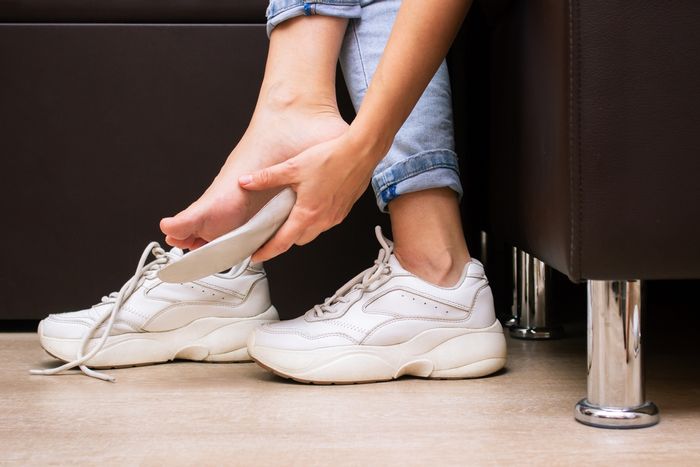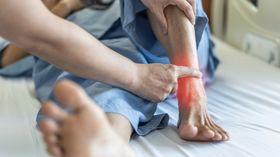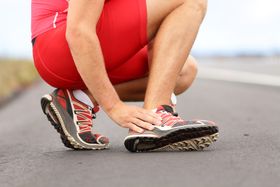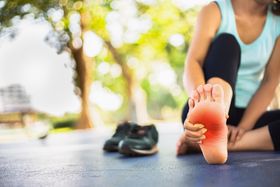Pain After Wearing Orthotics: Reasons and How to Stop It
Say goodbye to orthotic pain and hello to relief. Discover the secrets to a comfortable fit
Updated January 20, 2025.

Imagine investing time and money in orthotics, expecting them to alleviate your foot discomfort, only to find yourself in more pain than before. This frustrating scenario is all too common, especially with ill-fitting insoles.
Let's find out why this happens and what you can do to ensure you get the full benefit of your orthotic support.
» Avoid the discomfort of ill-fitting orthotics with custom-made solutions
Can Orthotics Cause Foot Pain?
While orthotics are designed to provide support and alleviate pain, they can sometimes have the opposite effect. A certain amount of initial discomfort is normal as your feet adapt to new orthotics, but persistent pain should not be ignored as it often signals an underlying issue that needs attention.
Here are some common reasons for pain from orthotics:
- Improper Design or Fit: Orthotics that hurt your feet are often due to poor design or improper fitting. Custom orthotics, designed after a comprehensive biomechanical assessment, are ideal.
- Incompatible Footwear: Using orthotics with inappropriate shoes can exacerbate existing problems and cause additional pain. Ensure your footwear complements your orthotics for maximum benefit.
- Short Break-in Period: Wearing new orthotics too long too soon can lead to discomfort. Your body needs time to adjust to the new support system.
» Podiatrists recommend these insoles if you're walking all day
Side Effects of Wearing the Wrong Orthotics
Ill-fitting or improperly used insoles can lead to a cascade of unintended consequences throughout your body:
- Arches: Off-the-shelf insoles often fail to match your unique arch shape. High arches might not receive enough support, while low arches could be over-supported. This mismatch leads to increased pressure points and pain.
- Knees: Incorrect support can alter your gait, potentially causing or worsening knee pain. When your feet aren't properly aligned, it can create a domino effect, impacting your knee joints.
- Shins: Orthotics that don't complement your foot mechanics may lead to compensatory movements. This can increase stress on your shin bones and muscles, raising the risk of shin splints.
- Hips: Your entire lower body alignment can be thrown off by ill-fitting orthotics. This misalignment can travel up from your feet, through your legs, and into your hips, resulting in hip discomfort or even lower back pain.
- Feet: Wearing orthotics for too long, too soon can overwhelm your feet, causing general pain and discomfort. This is especially true if the orthotics are not suited to your foot type.
The Customization Solution
Most of these issues stem from one root cause: poor-fitting insoles. Custom orthotics, tailored to your unique foot structure and gait, can help avoid these problems. Here's why they're worth considering:
- Precise Fit: Custom orthotics are molded to your feet, providing support exactly where you need it.
- Gradual Adjustment: With proper guidance, you can slowly increase wear time, allowing your body to adapt comfortably.
- Comprehensive Assessment: A professional evaluation ensures your orthotics address your specific needs, reducing the risk of compensatory injuries.
- Long-Term Comfort: While the initial investment may be higher, custom orthotics often prove more comfortable and durable in the long run.
Companies like Upstep offer at-home foot impression kits, making custom orthotics more accessible than ever. Their process is quick and easy—order a kit online, create your foot impression at home, and receive custom orthotics in about two weeks.
Tips to Prevent Pain from Wearing Orthotics
Even with custom orthotics, an adjustment period is normal. Here are some guidelines to follow:
- Start by wearing them for just an hour a day, gradually increasing over 2–4 weeks.
- Avoid using orthotics for strenuous physical activity until you're comfortable with them.
- Give yourself rest periods between wearing the orthotics to allow your body to adapt.
- If discomfort persists after 3 weeks, consider getting your orthotics adjusted.
- Maintain your orthotics properly to prolong their lifespan and ensure consistent support.
» Stop pain in its tracks. Check the best insoles for Hallux Limitus
Are Custom Orthotics Worth It?
Orthotics should solve your foot problems, not create new ones. While they can be a powerful tool for addressing foot issues, the key lies in the right fit and a gradual introduction. Custom orthotics, though more expensive initially, are often worth the investment for their personalized support and long-lasting comfort.
Remember, you're not just buying a product; you're investing in a tailored solution for long-term foot health and overall well-being.
FAQs
How long before orthotics stop hurting?
The amount of time it takes for orthotics to stop hurting can vary greatly. Factors like the severity of your foot condition, the type of orthotics you're wearing, and how well your body adjusts to the changes they bring can all influence the timeline.
Can orthotics cause hip pain?
Yes, hip pain can occur after wearing orthotics. If orthotics are not fitted properly or if they're not addressing the underlying cause of your foot pain, they can alter your gait and put increased stress on your hips, potentially leading to discomfort or pain.
Why do orthotics hurt my arches?
Orthotics can sometimes cause arch pain due to a few key factors. Improper fit is a primary culprit.
If the orthotics are too stiff, too rigid, or don't adequately support your specific arch type (high, normal, or flat), they can inadvertently increase pressure on your arches, leading to discomfort.
Do orthotics weaken foot muscles?
No, orthotics do not weaken foot muscles. In fact, they can help strengthen them. Orthotics provide support and stability to your feet, which can help to improve foot function and reduce pain.
This can encourage you to be more active and put weight on your feet, which can help to strengthen your foot muscles.
Can you wear orthotics too long?
Yes, it's possible to wear orthotics for too long. Continuous use can weaken the intrinsic muscles of the foot, as these muscles require some level of natural challenge to maintain strength.
Remember to give your feet regular breaks from the orthotics to allow for natural movement and muscle engagement
Disclaimer: The information on this blog is for educational purposes only and is not a substitute for professional medical advice. Upstep does not provide medical diagnosis or treatment. While qualified healthcare professionals create our content, it's essential to consult with your healthcare provider for any foot or ankle concerns you may have.











